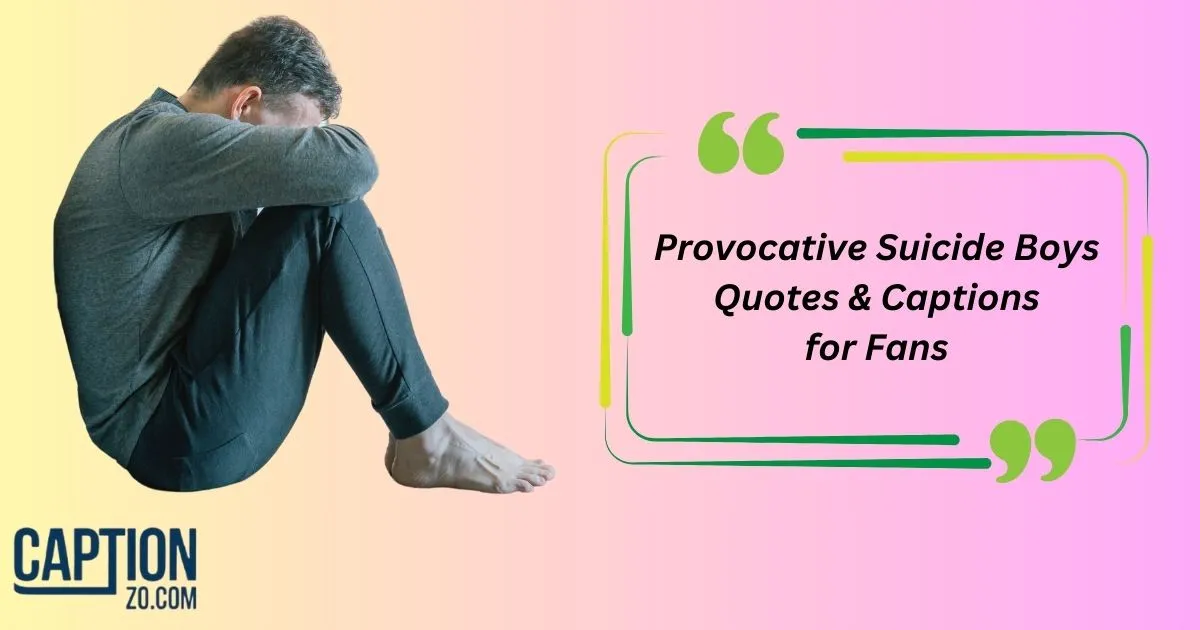“A heart full of scars is a map to survival.”
The Suicide Boys, renowned for their raw and unfiltered approach to music, have built a cult following by fearlessly addressing themes like pain, struggle, and resilience. Their lyrics often resonate deeply with fans, touching on life’s darkest corners while finding strength in vulnerability. When you’re looking for inspiration, relatability, or a glimpse into their unique worldview, the Suicide Boys’ quotes hold a powerful allure.
Their artistry merges intense emotion with gripping honesty, creating lyrics that often double as bold declarations or deeply personal confessions. Fans gravitate toward their ability to capture complex emotions in just a few words. These quotes not only inspire but also serve as reminders that even in darkness, there is a spark of light.
From battling inner demons to embracing life’s chaos, the Suicide Boys’ lyrics reflect a journey that’s as turbulent as it is transformative. Let’s dive into some of their most striking quotes, perfect for captions or personal reflections.
Battling Inner Demons
- Understanding the nature of inner demons.
- Recognizing personal triggers.
- The role of childhood trauma.

- Coping mechanisms and their effectiveness.
- The impact on mental health.
- Facing guilt and self-blame.
- The journey toward self-forgiveness.
- Seeking professional help.

- Spiritual or philosophical approaches.
- Turning inner battles into strengths.
- Long-term strategies for managing inner demons.
Struggles with Reality
- Defining reality and perception.
- The impact of mental illness on reality.
- Distinguishing between reality and delusion.
- Escapism: healthy and unhealthy forms.
- Societal expectations versus personal truth.
- The role of substance abuse in warping reality.
- Coping with existential crises.

- The influence of media and technology on perception.
- Finding grounding techniques.
- The value of self-awareness.
- Accepting the fluidity of reality.
Embracing Darkness
- What does it mean to embrace darkness?
- The allure of the unknown.
- Learning from shadows within oneself.
- The role of creativity in processing dark emotions.
- Historical and cultural perspectives on darkness.
- Accepting flaws as part of the self.
- Exploring gothic and nihilistic philosophies.
- The balance between light and dark in life.

- Overcoming the fear of the abyss.
- Transforming darkness into growth.
- The beauty of resilience found in darkness.
Life and Death Reflections
- The inevitability of death.
- Philosophical perspectives on mortality.
- The meaning of life in the face of death.
- Grieving the loss of loved ones.
- Cultural rituals surrounding life and death.
- Personal near-death experiences.
- Death as a motivator for living fully.
- Exploring afterlife beliefs.
- Coping with fear of death.
- Accepting life’s fleeting nature.
- Leaving a legacy.
“Funny and Relatable Quotes for Daily Laughter“
Love and Loss
- The duality of love and loss.
- Coping with heartbreak.
- Understanding grief and its stages.
- The impact of unrequited love.
- How loss strengthens or weakens love.
- Moving forward after loss.
- Rebuilding trust in relationships.
- Lessons learned from loss.

- The catharsis of expressing pain.
- Love’s resilience amid suffering.
- Finding hope after loss.
The Weight of Depression
- Understanding the symptoms of depression.
- The societal stigma surrounding depression.
- How depression alters thought patterns.
- The isolation caused by mental illness.
- The role of therapy and medication.
- The impact on personal relationships.
- Recognizing when to seek help.
- Self-care techniques for managing depression.

- Fighting daily battles with small victories.
- Sharing stories to break the stigma.
- Finding light in the darkest moments.
Seeking Solitude
- Solitude versus loneliness.
- The psychological benefits of alone time.
- Overcoming the stigma of seeking isolation.
- Cultivating mindfulness in solitude.
- Discovering creativity in quiet moments.

- Strengthening independence through solitude.
- Avoiding over-reliance on social validation.
- The impact of digital detox on mental clarity.
- How nature enhances solitary experiences.
- The balance between solitude and social interaction.
- Embracing solitude as self-care.
Finding Strength in Pain
- Recognizing pain as a teacher.
- Transforming adversity into resilience.
- Understanding the growth mindset.
- Channeling pain into creative expression.
- Pain’s role in building empathy.
- Learning from failure and rejection.
- Seeking support in difficult times.

- Finding inspiration in others’ perseverance.
- Celebrating small victories.
- Accepting pain as part of life’s journey.
- Turning personal struggles into universal messages.
Questioning Existence
- The nature of existential questions.
- Philosophical approaches to existence.
- The role of religion and spirituality.
- Science and the quest for meaning.
- Coping with existential anxiety.
- The impact of existentialism on art and literature.
- Finding meaning in everyday life.
- Exploring purpose beyond material pursuits.
- Embracing uncertainty in existence.
- Engaging with existential thought leaders.
- Living authentically despite unanswered questions.
Embracing the Chaos
- The unpredictability of life.
- Accepting loss of control.

- Finding joy in spontaneous moments.
- How chaos breeds creativity.
- Letting go of perfectionism.
- Navigating chaotic environments.
- Chaos theory and its life applications.
- Recognizing patterns within disorder.
- Transforming anxiety into action.
- Cultivating resilience amidst chaos.
- Embracing chaos as a path to growth.
Facing Fear
- Understanding the nature of fear.
- Identifying personal fears.
- The physiological impact of fear.
- Overcoming fear through exposure.
- The role of fear in survival.
- Fear as a motivator.
- Building courage in small steps.
- The impact of fear on decision-making.
- How stories and myths tackle fear.
- Transforming fear into empowerment.
- Facing fear with support and solidarity.
The Struggle for Identity
- Understanding personal identity.
- The influence of culture and upbringing.
- The impact of societal expectations.
- Navigating identity during adolescence.
- The challenges of self-discovery.
- Identity crises and how to cope.
- The role of relationships in shaping identity.
- Finding authenticity in a conformist world.
- Exploring gender and sexual identity.
- How life transitions affect identity.
- Embracing a fluid and evolving sense of self.
The Power of Music
- Music as a universal language.
- Emotional healing through music.
- The influence of music on culture.
- The science of music and brain function.
- Music as a form of self-expression.
- The role of lyrics in storytelling.
- Using music to connect with others.
- Music therapy and mental health.
- How music inspires creativity.
- The evolution of personal taste in music.
- Music as a tool for activism and change.
Coping with Addiction
- Recognizing addiction as a disease.
- The psychological and physical toll of addiction.
- The stigma surrounding addiction.
- Seeking professional help and intervention.
- Understanding the role of support groups.
- The importance of relapse prevention.
- Building a strong support network.
- Addressing the root causes of addiction.
- Finding healthy coping mechanisms.
- Celebrating recovery milestones.

- Advocating for awareness and compassion.
The Depth of Despair
- Understanding the nature of despair.
- The emotional and physical effects.
- How despair isolates individuals.
- Recognizing the signs in oneself or others.
- The role of empathy in addressing despair.
- The importance of seeking help.
- Coping strategies for moments of despair.
- Finding hope in unexpected places.
- The transformative power of resilience.
- How despair influences art and literature.
- Turning despair into motivation for change.
Finding Meaning in Pain
- Pain as a part of the human experience.
- The psychological effects of suffering.
- Discovering personal growth through adversity.
- The role of faith and philosophy.
- How pain shapes compassion and empathy.
- Storytelling as a way to process pain.
- Embracing the lessons learned.
- Turning pain into a purpose-driven life.
- The influence of community support.
- Accepting pain as a teacher.
- Celebrating triumphs over hardship.
Living on the Edge
- The appeal of high-risk lifestyles.
- The psychological profile of thrill-seekers.
- How living on the edge impacts relationships.
- Adrenaline and its addictive nature.
- Balancing risk with responsibility.
- Learning from near-miss experiences.
- Societal perspectives on risk-taking.

- Exploring the boundary between bravery and recklessness.
- The role of mindfulness in risk management.
- Finding purpose in high-stakes situations.
- Turning danger into a life lesson.
The Burden of Secrets
- The emotional toll of keeping secrets.
- Why people choose to conceal truths.
- How secrets impact trust in relationships.
- The fear of judgment and its role in secrecy.
- Recognizing when secrets are harmful.
- Confession as a means of liberation.
- The importance of safe spaces for disclosure.
- The ripple effect of hidden truths.
- Exploring ethical dilemmas tied to secrets.
- Finding forgiveness and understanding.
- Moving forward with transparency.
Key Insight:
1.What makes Suicide Boys’ quotes so impactful?
Their raw authenticity and ability to touch on universal struggles make their lyrics relatable and emotionally charged.
2.Can I use Suicide Boys’ quotes as captions?
Absolutely. Their thought-provoking lines are perfect for expressing mood or attitude in posts.
3.What themes do Suicide Boys explore in their lyrics?
They delve into mental health, addiction, existential questions, resilience, and navigating chaos in life.
4.Are their lyrics inspired by personal experiences?
Yes, their music often reflects their personal battles and journeys, adding depth to their work.
5.How can I connect with their fan community?
Engage on social media, join fan forums, and attend their concerts to find like-minded fans.
Wrap Up
The Suicide Boys’ quotes transcend simple lyrics; they’re mantras for those grappling with life’s challenges. Their unapologetic exploration of raw emotions has solidified their place as voices for the unheard.
When you’re a long-time fan or new to their music, these quotes serve as a reminder that struggle is part of the journey and survival is the reward.

Hi! I’m Lauren Reynolds, your go-to expert at Captionzo.com for crafting Instagram captions that resonate and amplify your social marketing game.



